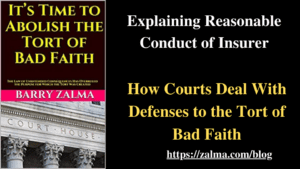Explaining Reasonable Conduct of Insurer

I will not be posting for a week after this but you have available more than 4250 posts and more than 400 videos at rumble.com/zalma.
See the full video at https://rumble.com/v17nfbd-explaining-reasonable-conduct-of-insurer.html and at https://youtu.be/AWkk0PffGy4
When the Court found that an insureds claim was debatable, the bad-faith claim must fail. Bad-faith claims were insufficient as a matter of law where the status of Kentucky law on the issue was “fairly debatable.” [Willowbrook Invs., LLC v. Md. Cas. Co., 325 F.Supp.3d 813 (W.D. Ky. 2018)
The courts, legislatures and the insurance departments of the various states must recognize that an insurer with the best of all possible fraud investigation units will, on occasion, err. A company with a highly trained and motivated fraud investigation unit made up of professional investigators and attorneys who are human, will err on occasion.
The public, and those who serve on juries, must understand that an aggressive fraud investigation, even if it reaches an incorrect result, is not malicious and if negligent, not an act of bad faith.
Today, if a jury believes the insurer was wrong in its decision, it must award punitive damages, regardless of the instructions read to it by the judge about the elements of the tort. Because of the bad publicity created by the policyholders’ bar and the press reports of massive bad faith judgments, insurers are not liked by a majority of the people who serve on juries. The prudent defense lawyer will assume that at least three of the jurors will voted for the policyholder, regardless of the evidence presented, and defense counsel must win over the remaining nine.
The bad publicity that was given to insurers by the early bad faith cases has poisoned the public image of insurers. The plaintiff insured only needs to convince six of the jurors who may sit in judgment without anti-insurer prejudice to receive a majority verdict with 9 votes.
As a business necessity, insurers must have the confidence of the public that they are financially sound, secure and have an overabundance of funds available to pay claims. The need to show the security of the company to the public has the effect of convincing juries that a multimillion-dollar verdict against the insurer will not hurt it. Plaintiffs’ lawyers disingenuously tell juries that they don’t want to harm the insurance company, all they want to do is get its attention. They argue that a $10 million verdict might cause an itch in the corporate pocketbook sufficient to cause management to scratch away the need to improperly reject claims. The argument is hard for a jury of working people to withstand.
The Tort of Bad Faith Has Served its Purpose
The tort of bad faith, and the punitive damages that seem to go with it, have, in my opinion, served their purpose. Insurers now have professional claims departments. Insureds are almost universally treated with courtesy and respect. More than 90% of all claims are resolved without litigation or argument. Legitimate claims are paid with alacrity.
Insurance fraud continues to grow. The amount of money taken from insurers every year are in the tens or hundreds of billions of dollars. The fear of punitive damages has made the fight against fraud difficult and almost impossible. Even when an insured is arrested, tried and convicted of the crime of insurance fraud, or attempted insurance fraud. Attempts will still be made to sue the insurer for the tort of bad faith.
Before I retired from the practice of law, I contended daily with insurers who wanted to fight fraud but who found they must decide to pay a claim rather than face the exposure of a punitive damage judgment. Sometimes, the settlement of bad faith lawsuits, where there has been no bad faith and an appropriate denial of a claim or refusal to pay a policy limits demand, the insurer concludes it must pay more to avoid a potential run-away jury.
I can, as my mentors taught me 53 years ago, state with confidence the opinion that an insurer should spend millions of dollars for the defense of a non-covered or fraudulent claim and not a dime for tribute to an insured who brings a spurious bad faith law suit.
However, practical insurance professionals have a need to resolve litigation as inexpensively as possible to protect the shareholders who want the insurer to make a profit. As a result, the insurer will disobey the millions for defense covenant and will make a business decision to pay the non-covered loss or the fraud, rather than take a chance on an adverse verdict.
As with all things in insurance, the attitudes of insurers move in cycles. More often than not, I am now called upon to testify as an expert in bad faith cases that the insurer insists on taking to trial by jury rather than pay off a scofflaw.
I can only hope that this cycle continues and more attempts at fraud are defeated.
The Fourteenth Amendment to the U.S. Constitution
No State shall make or enforce any law which shall abridge the privileges or immunities of citizens of the United States; nor shall any State deprive any person of life, liberty, or property, without due process of law; nor deny to any person within its jurisdiction the equal protection of the laws.
If the law allows an insured to sue for tort damages as a result of a breach of the covenant of good faith and fair dealing equal protection should allow an insurer to sue the insured for tort damages as a result of the breach of the same covenant. Some litigants cannot, under our system of constitutional law, be more equal than others. Yet, until a court agrees, insureds are more equal than their insurer.
Although the courts may think so, the insured’s breach of the covenant of good faith and fair dealing is also separately actionable as a contract claim and that some forms of misconduct by an insured will void coverage under the insurance policy. (Imperial Cas. & Indem. Co. v. Sogomonian (1988) 198 Cal.App.3d 169, 182.
To paraphrase what George Orwell opined in his novel Animal Farm some litigants are more equal than other litigants. Since both the insured and the insurer freely entered into the contract of insurance it would appear only fair if one is allowed to obtain tort damages for breach of the covenant of good faith and fair dealing the other should also have the same opportunity.
While Connecticut, like California, recognizes that every insurance policy carries “an implied duty requiring that neither party do anything that will injure the right of the other to receive the benefits of the agreement,” [De La Concha of Hartford, Inc. v. Aetna Life Ins. Co., 269 Conn. 424, 432–33, 849 A.2d 382 (2004)] no Connecticut court has recognized a tort of “reverse bad faith” against insureds, nor are Connecticut courts likely to do so in light of established precedent. It follows that because an insured’s breach of the covenant is not actionable in tort, an insurer cannot lessen responsibility for its own tortious conduct by putting forth an affirmative defense of bad faith. [Hartford Roman Catholic Diocesan, Corp. v. Interstate Fire & Cas. Co., 199 F.Supp.3d 559 (D. Conn. 2016)]
An insurer can commit the tort and is obliged to pay tort and punitive damages. An insured, who is totally evil, whose only interest in the insurance agreement is to defraud the insurer, who refuses to cooperate with the insurers investigation, who does everything possible to harm the insurer, cannot commit the tort.
The abuse of the tort of bad faith has become so extreme that the tort must, in my opinion, be eliminated. Since the weight of authority is that no matter how reasonable are the arguments to do away with the tort of bad faith, the tort must be applied fairly and equally to both insureds and insurers and if that is impossible the tort of bad faith is contrary to the requirements of the Fourteenth Amendment to the U.S. Constitution and its requirement for equal protection.
An insurer who is wronged by its insured should have the same right to tort damages and punitive damages for breach of the covenant as can the insured. No litigant should ever be more equal than another.

(c) 2022 Barry Zalma & ClaimSchool, Inc.
Barry Zalma, Esq., CFE, now limits his practice to service as an insurance consultant specializing in insurance coverage, insurance claims handling, insurance bad faith and insurance fraud almost equally for insurers and policyholders. He practiced law in California for more than 44 years as an insurance coverage and claims handling lawyer and more than 54 years in the insurance business. He is available at http://www.zalma.com and zalma@zalma.com.
Subscribe to Zalma on Insurance at locals.com https://zalmaoninsurance.local.com/subscribe.
Subscribe to Excellence in Claims Handling at https://barryzalma.substack.com/welcome.
Write to Mr. Zalma at zalma@zalma.com; http://www.zalma.com; http://zalma.com/blog; daily articles are published at https://zalma.substack.com. Go to the podcast Zalma On Insurance at https://anchor.fm/barry-zalma; Follow Mr. Zalma on Twitter at https://twitter.com/bzalma; Go to Barry Zalma videos at Rumble.com at https://rumble.com/c/c-262921; Go to Barry Zalma on YouTube- https://www.youtube.com/channel/UCysiZklEtxZsSF9DfC0Expg; Go to the Insurance Claims Library – https://zalma.com/blog/insurance-claims-library/
Like this:
Loading…
Related






